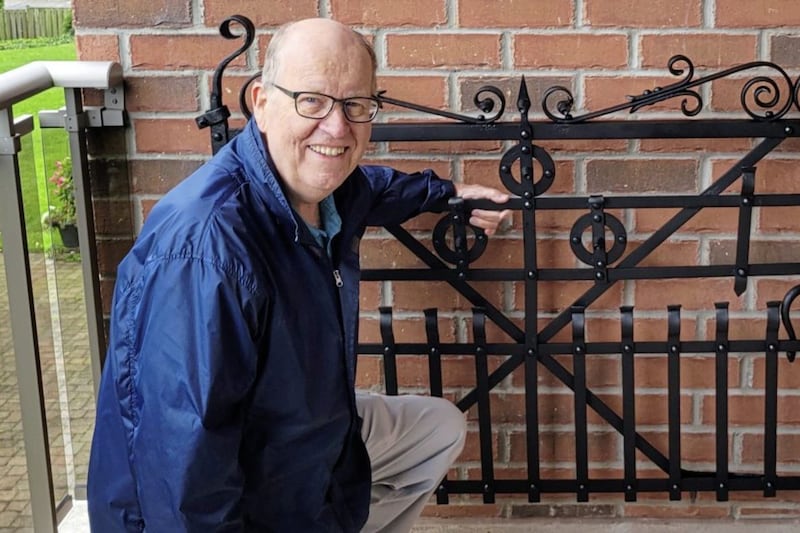THIS is the story of a gate.
A rusty, iron-wrought gate, the type that serves as the entranceway to many a home.
This one holds special memories - a gate that was at the front of my house in Belfast where I grew up before my family immigrated to Canada when I was 12.
The gate was my last - and lasting - image as the taxi pulled away for our trip to the docks to board the Ulster Prince to Liverpool, then the RMS Sylvania to Canada.
That was 63 years ago.
On each of my trips back to Belfast (there have been five) I’ve been drawn to the gate that has stood in front of my old Mount Merrion Park home since about 1950.
It is distinct because it is truly a work of art crafted by my blacksmith grandfather, William John Ross, of Armagh.
As I walked up that street three years ago with my son, Colin, I showed him one of grandpa’s gates and then challenged him to point out the others as we approached the house.
It was easy to do because they were unique. Not production-line, factory-built gates. Distinct. They had a particular style, a flourish of curves, swirls and twists of steel. Made with proud, worn, artistic hands.
To me, they had his character and personality shaped into them at his dark and dank Armagh forge.
During family visits, that forge allowed my imagination to roam.
I would spend hours pumping the bellows until the coke turned orange before hammering discarded horseshoes on his anvil … into hammered discarded horseshoes.
It was a time when the horse and buggy was being pushed aside in the 1950s by the automobile, so grandpa Ross had to find another means of eking out a living.
He became an artist in wrought iron, crafting gates as entrances to people’s homes and driveways.
When he died in 1960, having been a blacksmith for 60 years, his obituary read: "Due to the passing of the horse, Mr Ross had devoted most of his time during the 15 years prior to his retirement to the construction of field and ornamental entrance gates.
"Today there is scarcely a townland within a radius of five miles from Armagh which does not contain a specimen of his handiwork.
"He was an artist in iron and even as far away as Belfast the products of his skill are admired."
When my son and I arrived at my old family home, the gates were, as you would expect, showing their age. Rust invading the steel, peeling paint, but still retaining their original beauty and style in spite of their battering by time and weather.
And that is the last I remember thinking of the gates.
Until recently.
At the end of a lengthy conversation with my son, who lives in the United States in Fort Wayne, Indiana, he mentioned the gates.
We haven’t seen him, his wife, Christina, or our three grandchildren for more than a year because of Covid-19 and a closed Canada-US border. But he had returned once more to Belfast in 2018 and paid another visit to grandpa’s gates.
This time, one of the pair of entrance gates was missing.
In conversation with the owner of the house, Karen Gallagher, he learned one gate had been removed to fix the brick wall holding it in place. Later, she believes, someone swiped it to make some money for scrap metal.
So one gate remained and Karen generously agreed to part with it. And thus began its four-country journey.
Colin and his wife had it picked up and delivered to a plant in the Republic of Ireland owned by Christina’s family in Fort Wayne.
From there, they had it shipped in a company container to their home to be refurbished before presenting it as a gift to me - a gift that was to be delivered on my last birthday on St Patrick’s Day. But then, Covid and closed borders.
A piece of my Irish heritage will eventually be a piece of art on my condominium balcony, restored as close as possible to its former beauty, bringing an end to my pilgrimages to Mount Merrion Park.
There is one more detail worth noting.
The gate grandpa Ross crafted for our house in Belfast was slightly different from the rest.
It included two small horseshoes with his name stamped between them - W. J. Ross. His signature, if you will.
Those horseshoes and signature appeared only on one gate - the one not taken for scrap.





